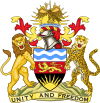
Politics of Malawi takes place in a framework of a presidential representative democratic republic, whereby the President of Malawi is both head of state and head of government, and of a multi-party system. Executive power is exercised by the government. Legislative power is vested in both the government and the National Assembly. There is a cabinet of Malawi that is appointed by the President of Malawi. The judiciary is independent of the executive and the legislature.

Malawi is a landlocked country in southeast Africa. It is wholly within the tropics; from about 9°30S at its northernmost point to about 17°S at the southernmost tip. The country occupies a thin strip of land between Zambia and Mozambique, extending southwards into Mozambique along the valley of the Shire River. In the north and north east it also shares a border with Tanzania. Malawi is connected by rail to the Mozambican ports of Nacala and Beira. It lies between latitudes 9° and 18°S, and longitudes 32° and 36°E.

Rumphi is the capital of the Rumphi District in the Northern Region of Malawi. It is a lively town with a market which serves the widespread farming community. Rumphi is noted for the kindness of the people. It is directly on the way to Nyika National Park Nyika Plateau and Vwaza Marsh Game Reserve. Unlike its larger neighbour, Mzuzu, which has mild sunny weather almost all year, Rumphi has a differing climate. The town, being surrounded by hills, always has a nice wind. The town is bounded by the Rumphi river in the east and the South Rukuru River in the south.

The Northern Region is a region of Malawi. It had a population of 2,289,780 in 2018, and covers an area of 26,931 km2, making it the smallest region both by population and area. Its capital city is Mzuzu. Starting in the north and going clockwise, the Northern Region borders on Tanzania, Lake Malawi, Malawi's Central Region, and Zambia.

The Central Region of Malawi, population 7,523,340 (2018), covers an area of 35,592 km2. Its capital city is Lilongwe, which is also the national capital. The region has an outlet on Lake Malawi and borders neighbouring countries Zambia and Mozambique. The Chewa people make up the majority of the population today.
Chitipa District is the northernmost district in the Northern Region of Malawi. The capital is Chitipa. The district covers an area of 4,288 km2, and has a population of 234,927. Chitipa borders fellow districts Karonga and Rumphi, as well as neighboring countries Tanzania and Zambia. The district is divided into five main areas known as Misuku to the east, Kameme to the north, Bulambia right at the centre while Wenya and Nthalire areas are situated to the south.
Dedza is a district in the Central Region of Malawi. It covers an area of 3,754 km.² to the south of the Malawi capital, Lilongwe, between Mozambique and Lake Malawi and has a population of 830,512. The capital is Dedza.

Ntcheu is a district in the Central Region of Malawi. It borders with the country of Mozambique. The district headquarters is Ntcheu, known as BOMA in the local language, but is most commonly called Mphate. It is run by Yeneya, the village headman. The district covers an area of 3,424 km.² and has a population of 659,608 people according to the 2018 Malawi Population and Housing Census. The Ntcheu district lies around halfway between Malawi's majors cities of Blantyre and Lilongwe - the capital city.
Rumphi is a district in the Northern Region of Malawi. The capital is Rumphi. The district covers an area of 4,769 km.² and has a population of 128,360.

Zomba District is one of twelve districts in the Southern Region of Malawi, surrounded by the districts of Chiradzulu, Blantyre, Mulanje, Phalombe, Machinga, Balaka and the Republic of Mozambique to the east. The total land area is 2,363 km2, representing three percent of the total land area of Malawi. The capital is Zomba.

The A2 Highway is a primary road in Zimbabwe running from Harare to Nyamapanda at the border with Mozambique. The Mozambican side border post is called Cochemane. This is a busy entry point used by people travelling by road between South Africa, Malawi, Zimbabwe and Mozambique. It starts at intersection with Samora Machel Avenue; however Enterprise Road itself begins from the T-junction with Robert Mugabe Avenue, opposite the market in Eastlea, east of Simon Muzenda Street Road Port; a bus terminus for inter-regional buses.
NBS Bank Limited, commonly referred to as NBS Bank, is a commercial bank in Malawi. It is licensed as a commercial bank, by the Reserve Bank of Malawi, central bank and national banking regulator.

The Synod of Livingstonia is a synod of the Church of Central Africa Presbyterian. It was founded by missionaries of the Free Church of Scotland in 1875.
The Diocese of Karonga is a see of the Roman Catholic Church suffragan of the Roman Catholic Archdiocese of Lilongwe. In 2010, it counted 61,000 baptized people among a population of 400,000 inhabitants. Its current bishop is Martin Anwel Mtumbuka.
Grace Chiumia, is a Malawian politician who has served as Minister of Civic education in the Malawian cabinet, since 24 October 2017. Before her current appointment, she was the Minister of Home Affairs and Internal Security, in the Malawian Cabinet, from 6 September 2016 until 24 October 2017.
The M1 road is a road in Malawi. The road serves as the backbone of Malawi's transportation network, stretching from the country's northern border with Tanzania at Kasumulu all the way down to the southern border with Mozambique at Marka. The north-south artery passes through the capital city of Lilongwe and the commercial hub of Blantyre, covering a total distance of 1,140 kilometers. As the longest road in Malawi, the M1 plays a role in connecting the country's major urban centers and facilitating trade and travel.
The Malawi Prison Service is a Malawian government agency responsible for the administration and management of prisons in Malawi.










